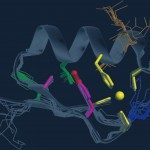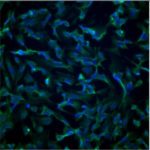Lien vers Pubmed [PMID] – 39252664
Lien DOI – 10.1002/cbic.202400293
Chembiochem 2024 Dec; 25(23): e202400293
Resistance to anti-microbial agents is a world-wide health threat. Thus, there is an urgent need for new treatments. An alternative approach to disarm pathogens consists in developing drugs targeting epigenetic modifiers. Bacterial pathogens can manipulate epigenetic regulatory systems of the host to bypass defences to proliferate and survive. One example is Legionella pneumophila, a Gram-negative intracellular pathogen that targets host chromatin with a specific, secreted bacterial SET-domain methyltransferase named RomA. This histone methyltransferase specifically methylates H3 K14 during infection and is responsible for changing the host epigenetic landscape upon L. pneumophila infection. To inhibit RomA activity during infection, we developed a reliable high-content imaging screening assay, which we used to screen an in-house chemical library developed to inhibit DNA and histone methyltransferases. This assay was optimised using monocytic leukemic THP-1 cells differentiated into macrophages infected with L. pneumophila in a 96- or 384-well plate format using the Opera Phenix (Perkin Elmer) confocal microscope, combined with Columbus software for automated image acquisition and analysis. H3 K14 methylation was followed in infected, single cells and cytotoxicity was assessed in parallel. A first pilot screening of 477 compounds identified a potential starting point for inhibitors of H3 K14 methylation.








